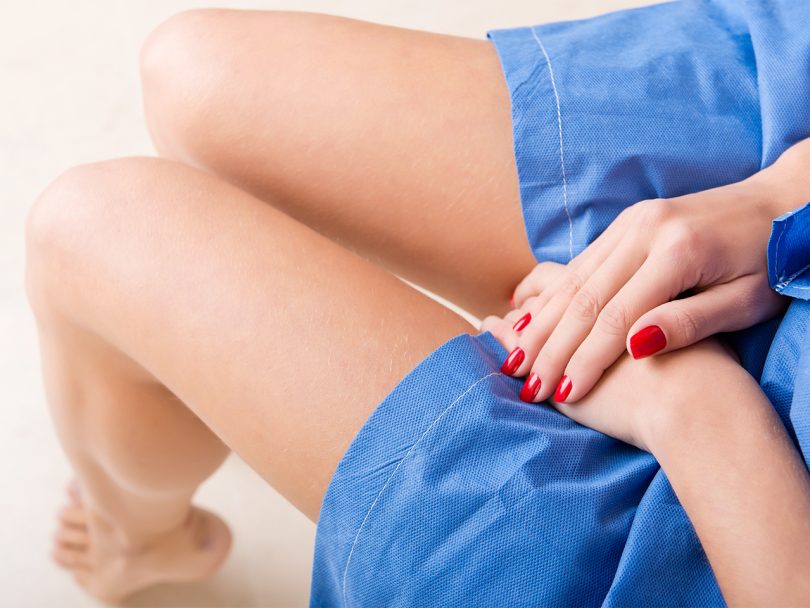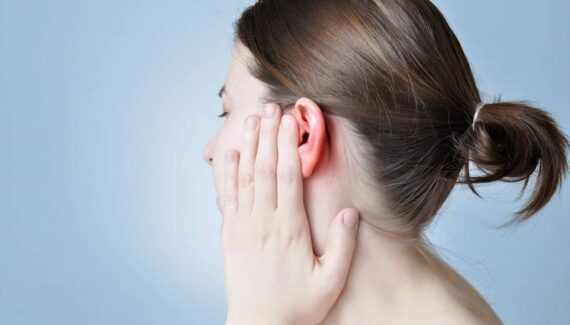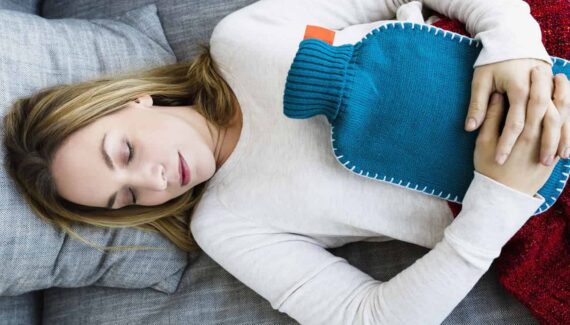Women have hormonal changes occurring before their periods, resulting in several unpleasant things like bloating, mood swings, and cramps. One such peculiarly annoying side effect occurs due to hormonal changes in the yeast infection. A yeast infection usually happens a week before your period, which is usual among childbearing age women. Even though the yeast infection incidence ahead of your periods is unknown, almost three among ten women have shown Candida yeast rising growth rate in a week before menstruation. So this Infection is turning very usual problem nowadays.
Yeast infection, also called Candidiasis, is featured by the itching all across the area, burning feeling while urinating, and thick white discharge. However, yeast infection occurs because of a lack of good bacterial regulation. Now, Can yeast Infection delay the period? To know this, continue scrolling further.

Contents
The Connection Between Periods and Yeast Infection
The vaginal environment is complex and typically comprises several bacteria playing a crucial role in supporting vaginal health. Lactobacillus is the bacterial mastermind making up ninety-five percent of a female urogenital tract flora and aids in maintaining the average pH level of the vagina, lesser than 4.5.
The ovarian hormones have a crucial role in preserving congenital vaginal flora. Also, it is known that the estrogen level can be an essential factor for lactobacilli development. The connection between estrogen level, yeast infection, and delayed period is fully demonstrated by research. However, some studies show that an elevated estrogen level is the risk ingredient for causing yeast infection. For instance, the high estrogen level in pregnancy can increase Candidiasis and Candida albicans risk. Therefore, consuming estrogens like oral contraceptives is related to elevated Candida albicans levels.
Even if few studies have explored a connection between yeast infection and estrogen level that alters in every menstrual cycle, there is no proven evidence associating periods and yeast infection.
Causes of Vaginal Yeast Infection Prior to Periods
A healthy vagina comprises a uniform mixture of bacteria and yeast. Hormonal changes may trigger menstruation and bacteria and Yeast imbalance naturally residing in the vagina. Candida is the excessive growth fungus type resulting in yeast infection. Moreover, many Candida strains may give rise to a yeast infection, while the most ordinary strain is known to be Candida albicans.
So, can yeast infection stop period? Fluctuating hormones result in hormonal flora imbalance, indicating a higher yeast infection risk every month. However, as per some studies, researchers found a more significant number of women suffering from vaginal bacteria and yeast imbalance at the beginning of the period. In addition, there are more than 200 distinct Candida kinds, yet, only five of them are linked with almost 90% of the yeast infections comprising Candida krusei, Candida parapsilosis, Candida tropicalis, Candida glabrata, and Candida albicans.
Even though hormones play a vital role in yeast infection development, they aren’t the sole criminal. There are many other possible causes:
Poor immune system:
The human immune system keeps control over yeast. However, when the immune function gets compromised, it may result in Candida overgrowth.
Uncontrolled diabetes:
Women with unrestrained diabetes can spike blood sugar levels daily. As yeast preys sugar, it can cause fungal overgrowth, generating yeast infection.
Antibiotics usage:
Antibiotics are for killing bacteria that make you sick. They even destroy other favorable bacteria during the procedure, maintaining the yeast level in control.
Poor diet:
Consuming food containing enough processed foods, sugars, and simple carbohydrates may satiate the yeast present in the body. Furthermore, excessive feeding may lead to uncontrollable yeast growth.
Psychological problems:
Psychological problems like prolonged stress bouts, anxiety, and depression are known to bring in recurring yeast infections, possibly because of conditions inhibiting immune system action.
Oral contraceptives and pregnancy:
Oral contraceptives and pregnancy may fluctuate hormonal balance, especially estrogen. So, when the estrogen level rises, it might disturb the average yeast balance.
Recurring yeast infection:
Individuals having frequent yeast infections have greater possibilities of facing one post period, and this can be because of the Cripple immune system and bad hygiene practices.
High-stress levels:
Higher stress levels adversely affect your health, particularly the immune system. Hence, when an immune system turns weak due to stress, the chances of Candida growth rise.
Yeast Infection Symptoms
Here are some general yeast infection symptoms and signs, including:
- Vulva swelling.
- Vagina soreness and pain.
- Rash inside and on the vagina.
- White and sticky vaginal discharge like cottage cheese without any odor; sometimes comes out watery.
- Stinging or burning to see during sex or urination.
- Vulva and vaginal irritation and itchiness.
A woman might develop or face even severe yeast infections when they:
- Have over five yeast infections every year.
- Hold severe symptoms causing excess redness, itching, and swelling resulting in tears, sores, and cracks.
- Don’t have well-regulated diabetes.
- Face yeast infection, which rises because of weird fungus kind.
- Have a poor immune system.
Can Yeast Infection Affect Periods?
People often question, Can yeast Infection delay period? First, you need to know some facts ahead of getting into whether a yeast infection affects your period. Even though some individuals consider that yeast infections might cause a delayed menstrual cycle, no approved medical deductions certify the same. Thus, factually, yeast infection isn’t regarded as responsible for affecting the monthly period cycle in any manner.
Nevertheless, you might face several discomforts when you have periods amid Yeast Infection. Periods usher hormonal changes in women resulting in Vagina pH alternation. In such instances, yeast infections might aggravate. Moreover, a yeast infection is known to increase with unduly moist surroundings. It often turns out a challenge to keep your vagina dry while in periods. You’ll require cleaning each time while changing sanitary napkins accurately. Hence, that area usually stays wet maximum throughout the day. Even the blood flow maintains that area moist. Furthermore, Yeast Infection may turn it even more difficult and painful to manage in such times. Nevertheless, cautious hygiene practices help deal with this to a specific extent.
One of the ideal ways for vaginal yeast infection treatment is to apply antifungal creams over the affected spot. However, even if it’s a straightforward and painless process, usually during periods, a local medication application might become an intricate affair. Furthermore, it might get painful also. Internal medicines are used for administering yeast infections; however, they usually show a slow response. Now that you know if yeast infection affects your period or not, let’s proceed further.
Vaginal Yeast Infection Prevention
You may aid in preventing yeast infections by taking proper care of your vaginal hygiene. Generally, Candida develops best in a moist and warm environment with enough bacteria. Even though there exists no such relationship between yeast infection and delayed period, it is advisable to follow the below few methods to avert this condition:
Avoid scented powders or tampons:
It is advisable to avert usage of scented tampons and powders because these contain toxic chemicals which might disturb the natural balance of many micro-organisms and good bacteria. It even advised stopping douching when you already have a yeast infection beforehand. This might spread yeast infection via the cervix towards the uterus.
Go for cotton underwear:
You may try putting on cotton undies to avert burning sensation and itching. Cotton clothes may alleviate yeast infection discomfort as well. However, it is better to avoid putting on panty liners as it might expand the danger of regaining yeast infection. Moreover, yeast grows in a humid atmosphere; thus, it is advisable to maintain a dry body to prevent this disease.
Change tampons and pads often:
Excess moisture might elevate the chances of yeast infection development. Hence, it is best to change tampons and pads frequently to maintain your vagina dry feasibly.
Avoid tight fit clothes:
It is recommended to avert putting on tight clothes like shorts and panties to stay dry and cool.
Avert douching:
Most people consider it ideal for vaginal cleaning, yet it might disturb yeast and bacteria balance in the vagina, causing several vaginal infections and yeast infections.
Check your medications:
Women often ask questions like; can Monistat delay your period? However, there lies a possibility that you might have a vaginal yeast infection because of antibiotic consumption. Thus, it is advisable to consult a physician regarding preventive antifungal therapies, which one might make at the starting until your medication course ends.
Have controlled Blood Sugar Level:
Women having diabetes can try managing their blood sugar levels to minimize yeast infection risks. Higher levels of blood glucose because of uncontrollable diabetes can cause all types of infections.
Avoid synthetic and nylon:
It is advisable to avert synthetic leotards and nylon pantyhose regularly. However, if you wish to wear these, go for a cotton panel to absorb moisture.
Avert wearing wet outfits for a long-time:
It is better to spend lesser time wearing wet swimsuits and gym gear. When you wear wet clothes, you provide enough damp room for these yeasts to develop.
When to Visit a Doctor?
It is the time to visit a doctor if:
- You aren’t sure in case you have got a yeast infection or not
- You’re going through pain
- You’ve extreme redness, swelling, or itching
- Your symptoms aren’t getting better even after over-the-counter suppositories or antifungal yeast infection creams for the vagina.
FAQs
Q. Can tampons develop a yeasts infection?
Ans. Candida aggravates in a highly humid environment; thus, pads and tampons may trap in much moisture, developing an environment for yeasts to flourish. This is why it is crucial to change lads and tampons often, especially in hot weather. It is advisable to change pads for at least 4-6 hours, while women can wear tampons for 4-8 hours.
Q. Do vaginal yeast infections smell unpleasant?
Ans. Yeast Infections usually generate an odorless white and thick vaginal discharge that resembles cottage cheese. The most usual vaginal Infection causing odor is Bacterial vaginosis. Few other general vaginal odor causes are poor hygiene, trichomoniasis, and tampons for many days.
Q. How much time does it take to get rid of yeast infection?
Ans. Treating yeast infections may cause alleviation of opposing cultures and symptoms among eighty to ninety percent of the patients to post complete treatment, whether controlled intra-vaginally or orally. However, they might need an extended antifungal treatment schedule in case of severe symptoms.
Q. Why do vaginal yeast infections cause more itching at night?
Ans. Although vulvovaginal itching symptoms might occur, it appears more distinguishable during the night. This is because fewer distractions make you much aware of the itching. When you try to sleep while lying still, it can cause increased bodily sensations awareness.
Q. Can Monistat delay your period?
Ans. No, Monistat doesn’t delay periods. So, if you face yeast infections, you may safely use Monistat even during periods, and it won’t affect or slow its flow.
Conclusion
Yeast infection is a common problem for most women prior to their periods; however, there’s no proof if yeast infection stops period. Even though one can’t control their hormonal changes triggering yeast imbalances, there are some steps that one might take to reduce the possibility of developing a yeast infection. These infections are incredibly uncomfortable yet can be treated and cured. Keep in mind to visit a healthcare provider when you suspect a vaginal yeast infection. Furthermore, it is necessary to have balanced nutrition to prevent infections. Also, ensure to have protein and fiber-rich diets and probiotics.


